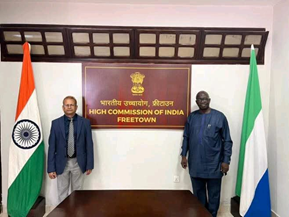The National Disaster Management Agency (NDMA) has held a high-level engagement with the Indian High Commissioner to Sierra Leone, His Excellency B. C. Pradhan, to discuss the establishment of a modern Early Warning System (EWS) that aims to significantly enhance Sierra Leone’s disaster preparedness and response capabilities.

The strategic meeting took place at the Indian High Commission on Wilkinson Road, Freetown, and followed a formal proposal submitted by the Indian Government two weeks prior, expressing its intent to support NDMA with technical expertise and institutional capacity-building in disaster risk management.
During the meeting, High Commissioner B. C. Pradhan praised the NDMA’s leadership in handling disaster-related issues across the country, and highlighted the critical role of early warning systems in mitigating disaster impact. “Coming from a disaster-prone country like India, I know firsthand how vital a robust early warning system is in saving lives and property,” he said. “The Government of India is committed to assisting Sierra Leone in establishing a model system that could become a benchmark within the region.”
In his remarks, NDMA Director General, Lieutenant General (Rtd) Brima Sesay, expressed sincere appreciation for India’s offer of support, and reiterated the Agency’s commitment to building a stronger disaster response framework. He noted that since its inception in 2020, the NDMA has made significant strides, including the creation of regional, district and chiefdom-level disaster management committees and offices in Bo, Kenema, Makeni, Port Loko and Freetown.
The Director General also revealed that the Agency has provided relief to more than 50,000 disaster victims and implemented numerous risk reduction initiatives, despite facing challenges such as limited early warning infrastructure, inadequate relief item storage and a shortage of operational vehicles. “India’s support comes at a crucial time and aligns perfectly with our ongoing efforts to strengthen our institutional capacity,” he said.
High Commissioner B. C. Pradhan further disclosed that the Indian Government has already identified a specialized company to implement the EWS project. Planned next steps include the selection of key Government stakeholders to support the initiative, a virtual coordination meeting with the Indian service provider, the signing of a Memorandum of Understanding (MoU) and the full rollout of the system alongside a comprehensive capacity-building phase that will include training NDMA personnel both in Sierra Leone and India.
The entire project is expected to be completed within a period of seven to fifteen months following the signing of the MoU.